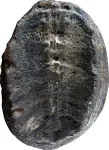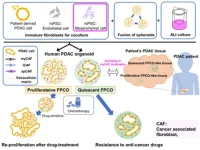(Press-News.org) ITHACA, N.Y. – A new study of paper wasps suggests social interactions may make animals smarter. The research offers behavioral evidence of an evolutionary link between the ability to recognize individuals and social cooperation.
Furthermore, genomic sequencing revealed that populations of wasps that recognized each other – and cooperated more – showed recent adaptations (positive selection) in areas of the brain associated with cognitive abilities such as learning, memory and vision.
The study focused on two distinct populations of paper wasps (Polistes fuscatus): A southern one from Louisiana where individuals are more uniform in appearance, and a northern one in Ithaca, where individuals have diverse color patterns on their faces. A series of experiments indicated that unlike southern counterparts, the northern population both recognized individuals and cooperated socially with some members over others.
“The evidence for strong recent positive selection on cognition, learning and memory is much stronger in the northern populations compared to the southern populations,” said senior author Michael Sheehan, associate professor of neurobiology and behavior at Cornell University.
While individuals from northern and southern populations are of the same species, they look very different. Southern paper wasps tend to have very similar red color patterns on their faces. The northern ones have black and yellow patterns.
“As you go further north, you find the individuals become more variable in their color patterning, such that roughly around the Carolinas, they start becoming substantially variable and continue to be more variable as you go further north,” Sheehan said. In the Ithaca population, every individual is pretty distinct.
Behavioral studies were conducted in the lab with the Ithaca population and then others from Louisiana. Over four days, a wasp would be introduced to a stranger, and their level of aggression was recorded. When paper wasps first meet, they often fight by snapping, biting and slapping. Over subsequent days, the wasp was introduced to a stranger, then back again with the wasp they had previously met, and finally with another stranger.
Wasps from the northern population were aggressive to strangers, but much less so to the wasp they had previously met. “Individuals in the southern population treat everyone the same,” Sheehan said. “They don’t show any evidence of changing their behavior as a result of previously meeting that particular individual, which suggests they’re not recognizing them.”
Though more study is needed, Sheehan reports that there’s some indication that wasps from the northern population have more stable nesting groups, whereas the southern wasps had high turnover of members when they occasionally made nests.
The data suggests that being able to recognize individuals makes northern wasps more selective and better able to manage their social profiles, whereas the more homogenous-looking southern wasps interact more indiscriminately and have less consistent, cohesive social interactions, Sheehan said.
The study was funded by the National Science Foundation and the National Institutes of Health.
For additional information, read this Cornell Chronicle story.
Media note: Pictures and video of paper wasps can be viewed and downloaded here.
-30-
END
Wasps that recognize faces cooperate more, may be smarter
2023-12-07
ELSE PRESS RELEASES FROM THIS DATE:
Key to fatty liver disease and its consequences for billions of people
2023-12-07
Key to fatty liver disease and its consequences for billions of people
The global rise in obesity and diabetes is leading to an epidemic in fatty liver disease affecting 20-30 per cent of the world’s population. Almost a third of people with fatty liver disease go on to develop an advanced form of the disease, known as non-alcoholic steatohepatitis (NASH) that can progress to cirrhosis and end-stage liver disease, or even liver cancer, and is a major risk factor for cardiovascular disease.
Why some people remain relatively healthy with fatty liver disease and some go onto potentially life-threatening illness has been a mystery. Until now.
A study ...
It turns out, this fossil plant is really a fossil baby turtle
2023-12-07
From the 1950s to the 1970s, a Colombian priest named Padre Gustavo Huertas collected rocks and fossils near a town called Villa de Levya. Two of the specimens he found were small, round rocks patterned with lines that looked like leaves; he classified them as a type of fossil plant. But in a new study, published in the journal Palaeontologia Electronica, researchers re-examined these “plant” fossils and found that they weren’t plants at all: they were the fossilized remains of baby turtles.
“It was truly surprising to find these fossils,” says Héctor Palma-Castro, a paleobotany student at the Universidad Nacional de Colombia.
The plants in question ...
Novel and promising pancreatic cancer organoids for effective screening of anticancer drugs
2023-12-07
Pancreatic ductal adenocarcinoma (PDAC), that arises from pancreatic epithelial cells, is the most common form of pancreatic cancer, with a very high mortality rate. This elevated mortality is associated with the unique tumor microenvironment (TME), known for increased resistance to chemotherapy and high metastatic potential. TME is characterized by the presence of a complex stromal structure comprising cancer-associated fibroblasts (CAFs), tumor endothelial cells (TECs), and a variety of immune cells.
CAFs are specific cells, primarily involved in the overall aggressiveness and spread of cancer cells. These cells can further be categorized into several types based on their ...
New certification applies proven science to tobacco cessation treatment
2023-12-07
DALLAS, December 7, 2023 — The Tobacco Endgame — the path to ending tobacco use and nicotine addiction in the U.S. — is within sight, but there has been a sharp increase in electronic cigarette use among high school students, from 1.5% in 2011 to about 27.4% in 2019.[1]
The American Heart Association, the world’s leading nonprofit organization focused on heart and brain health for all, is collaborating with the Association for the Treatment of Tobacco Use and Dependence (ATTUD) to change that. New individual certification as a Certified Professional by the American Heart Association – Tobacco Treatment is ...
Ancient Balkan genomes trace the rise and fall of Roman Empire’s frontier, reveal Slavic migrations to southeastern Europe
2023-12-07
A multidisciplinary study led by the Institute of Evolutionary Biology in Spain (a joint center of the Spanish National Research Council and Pompeu Fabra University), the University of Belgrade in Serbia, the University of Western Ontario in Canada, and Harvard University in the USA, reconstructs the genomic history of the Balkan Peninsula during the first millennium of the common era, a time and place of profound demographic, cultural and linguistic change. The team has recovered and analyzed whole genome data from 146 ancient people excavated primarily from Serbia and Croatia—more than a third of which came from the ...
Ancient DNA analysis reveals how the rise and fall of the Roman Empire shifted populations in the Balkans
2023-12-07
Despite the Roman Empire’s extensive military and cultural influence on the nearby Balkan peninsula, a DNA analysis of individuals who lived in the region between 1 and 1000 CE found no genetic evidence of Iron Age Italian ancestry. Instead, a study published December 7 in the journal Cell revealed successive waves of migrations from Western Anatolia, central and northern Europe, and the Pontic-Kazakh Steppe during the Empire’s reign.
From the 7th century CE onwards (coincident with the fall of the Western Roman Empire), large numbers of people emigrated from Eastern Europe, likely related to the arrival of Slavic-speaking populations, which ...
Why presence of healthy cells enables cancer to resist treatment
2023-12-07
Chemotherapy becomes less effective because healthy cells push cancer cells to grow more slowly, according to two studies from researchers at UCL and Yale.
In the two studies, supported by Cancer Research UK and published in Cell, researchers used ‘mini-tumours’ and the latest single-cell analysis technologies to begin to solve the puzzle of why healthy cells in a patient’s bowel cancer tumour might lead to poor outcomes.
Bowel cancer kills over 900,000 people a year and is the second highest cause of cancer mortality worldwide. In the UK, it accounts for 10% of all cancer deaths.
In the first study, UCL researchers used the latest single-cell analysis ...
Cocoa extract supplement found to have benefits for cognition among older adults with lower diet quality
2023-12-07
WHO: Mass General Brigham researchers, Dr. Chirag Vyas and Dr. Olivia I. Okereke at Massachusetts General Hospital, and Dr. Howard Sesso and Dr. JoAnn Manson at Brigham and Women’s Hospital
WHAT: Cocoa extract has shown a potential protective effect on cognition but randomized clinical trials in older adults have had inconsistent results. A new study of cognition in a randomized trial, known as the Cocoa Supplement and Multivitamin Outcomes Study (COSMOS), suggests that taking cocoa extract supplements containing 500 mg per day of cocoa flavanols had cognitive benefits for older adults who had lower habitual ...
New Case Western Reserve University study finds diabetes drug may reduce risk for colorectal cancer
2023-12-07
CLEVELAND—A groundbreaking study by researchers at Case Western Reserve University suggests a class of medications used to treat type 2 diabetes may also reduce the risk of colorectal cancer (CRC).
The findings, published today (Dec. 7) in the journal JAMA Oncology, support the need for clinical trials to determine whether these medications could prevent one of the deadliest types of cancers. Eventually, the medications may also show promise in warding off other types of cancer associated with obesity and diabetes.
“Our results clearly demonstrate ...
Ecology: Mediterranean green turtles nesting range expands under warming climate
2023-12-07
Rising global temperatures could lead to an increase in the nesting range of green turtles in the Mediterranean Sea, according to a modelling study published in Scientific Reports. Under the worst-case climate scenario, the nesting range could increase by over 60 percentage points, spreading west from the current area to include much of the North African, Italian, and Greek coastlines.
Human-caused climate change has caused sea surface temperatures to increase globally, with severe impacts on some marine life. Sea turtles are potentially particularly susceptible, as the sex of their offspring is dependent on incubation temperature. Although previous research ...



